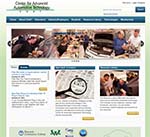
Center for Advanced Automotive Technology (CAAT)
http://autocaat.org/Home/
The Center for Advanced Automotive Technology (CAAT) reforms current automotive technology education by introducing advanced power train technologies such as hybrid electric and electric vehicles, alternative fuel vehices and new generation diesel, and biofuel and fuel cell vehicles. Building on past work, the regional Center provides industry-driven leadership for activities to reform current automotive technician education at the secondary and postsecondary levels. The Center collects and synthesizes curricula, integrates 21st century skills into them, creates web-based dissemination tools, and provides professional development for faculty. Awards are provided to secondary and postsecondary faculty to do curriculum reform that infuses educational research and industry needs. Articulation models promote continued education from secondary school through two-year colleges to bachelors programs particularly in a consortium of institutions in Southeastern Michigan. The evaluation produces a continuous and on-going flow of information that is used to support CAAT's commitment to reach its goals and ensure its successes.


